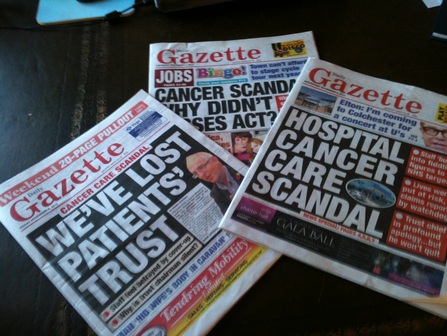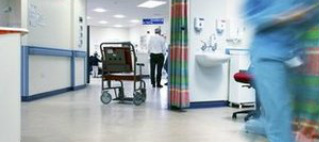Colchester hospital cancer scandal:
false figures and a catalogue of complacency
|
Friday 8 November, 2013
Here's a piece of objective reporting.
It concerns a hospital that I regard with open distaste and the coverage of a scandal there by a newspaper for which I used to work as health correspondent (long before this hospital was built). To tie things up neatly, I sat for seven hours at the bedside of the paper's former editor as he breathed his last in that hospital. My sister and a close friend also died there. Would any of them have lived had they been treated somewhere else? To be honest, probably not - and certainly not for long. They were all victims of injudicious lifestyles. But you notice little things when you're visiting someone in hospital and casting your eyes around trying to find something to talk about. Little things like the cleaner who uses the same cloth to wipe spills from the floor and the patients' tray tables. And the fact that she doesn't move anything on those trays as she wipes around, but not under, the glass of water, the orange juice carton, the book. Little things like the unthinking grimness of the 'bereavement suite', where people are taken to deal with the fact that a loved one has just died - a gloomy cavern with a dull grey carpet and upright chairs pushed to the wall that had all the charm of a basement nightclub in Ibiza at midday. No, I don't hold Colchester General in high esteem; I admit my prejudice. But here goes.... |
The Gazette v the nationalsThe police are called in after your local hospital is found to have tampered with records to make it appear that it was meeting government targets - and may in the process have put cancer patients in danger or even killed them.
The story breaks when your paper is on the streets and there's no going back. It leads the radio news bulletins all afternoon and the television news in the evening. It's all over the national front pages the next day. What to do? Get it up on the web as fast as possible and splash on it in the next day's print edition of course. But what else? The timing of the cancer scandal at Colchester General wasn't helpful for the Daily Gazette. It was by far the most important issue of the day, but by the time the paper appeared on Wednesday, most people knew about it. What most people didn't know was that Elton John was to play a gig at the town's football stadium. For a town like Colchester that's a big deal, and on any other day it would have breezed into the splash slot. In fact, it did on the web, which had covered the hospital through the previous day. The 'most read' panel vindicated the approach, with Elton at the top and the hospital well down. The hospital coverage online was hit and miss. The intro was wrong/out of date and was never changed. Instead there was a stream of updates tagged on to the bottom. How many people would see them? At the same time, bizarrely, a more coherent Press Association version appeared under the 'national' tag. The paper has a policy of 'web first, newspaper best', which means paying customers get analysis and background that is not published online. It also uses the web to direct readers to the 'full version' in print, which is quite a smart marketing ploy. But it does seem strange when the best rendition of a local story comes from a London news agency. For Wednesday's print edition, the priorities were clear: a textless splash on the hospital and a clean puff on the stadium gig. Inside, Elton was given the 2-3 spread before the paper got its teeth into the hospital on pages 4-7. The distribution of material was odd: a four-column picture of the health trust's chief executive and extended quotes of officials saying how sorry they were on page 5, yet the damning assertion from the chief inspector of hospitals: 'It is shocking to think people's lives may have been put at risk for the sake of the waiting time figures' was buried on page 7. What was needed was a coherent write-through covering the most important points and then some case studies, background, factboxes. The paper did use breakouts - a patient whose treatment was delayed by more than four months, the hotline for concerned families. Another pointed out that the 61 records examined by the Care Quality Commission were 'a small sample' from those relating to patients treated since the end of 2011. Hang on a minute. A small sample. This is where further work was required from the reporter:
Could 3,000 patients or more have been put at risk? It's an extreme extrapolation, but the question needed to be put. The paper also had quote panels from patients describing their experiences at the hospital, most of them favourable, but it must have been gutted to be scooped by the Mail in its interview with Danielle Cackett over the death of her four-year-old son Mackenzie last year.
His case has featured in the Gazette several times and the paper has reported that Mrs Cackett has formally complained about his treatment at the hospital. (Once again, the 'national' section of the website carries a PA version of this story rather than home-produced copy.) It is natural to turn to the local paper when a story about your town or people you know hits the national headlines. Its big advantages over the nationals are - or should be - context and contacts. With an active news story such as a bank robbery or a murder, it is relatively simple. A slow-burning hospital scandal is trickier. There is a greater responsibility to inform without being alarmist. Every one of your readers may one day need hospital treatment, and if they do, they are unlikely to have any choice about where they receive it. It's not just another bit of 'health service shambles', another row about bureaucracy and the tyranny of targets. It could, for every reader, be a matter of life of death. That is why it is so important to bring out the background knowledge that comes with covering the patch day in day out. As one journalist involved said: 'Before this scandal, the Gazette had been giving really thorough coverage to the hospital, often telling the story through patients’ experiences. We also highlight the good stuff. For example, we support the hospital’s staff awards scheme and we have a weekly slot in the Your Life supplement highlighting a key member of staff at the hospital. So, hopefully, our readers trust us because we aren't just here to knock the hospital - although we are giving them a good kicking this week.' A kicking that included a withering leader that said: 'The hospital is once again making reassuring noises. The tragedy is, who will believe it?' This is exactly right. Looking back over the paper's archives for the past five years, it is alarming to see how when things go wrong, officials invariably respond with trite statements about how disappointed they are about the patient's concern. The IT system, the snow, a flu epidemic or whatever was to blame and everything is now improving. [I also think it is inappropriate for officials to tell families concerned about their loved ones that the hospital sees their misfortune as 'an excellent opportunity' to review patient care - or to sign off an apology for the bungling that left a child a paraplegic 'we wish him all the best', but maybe I'm being over-sensitive.] And plenty has gone wrong. Colchester General has been put in special measures before because of its high death rate, the trust's last chairman was removed because of the hospital's poor performance, it has failed to meet cancer treatment targets month after month (which may explain the tampering with figures last year), and it was yet another investigation into the number of deaths there that led to the CQC inspections this summer. It has paid out more than £7m in damages to 58 patients over the past three years. It would have been helpful if the Gazette had put together a timeline of the hospital's ups and downs - it would have filled an entire page - as well as a panel on the cast of characters and the various authorities overseeing the hospital's activities. It is also worth remembering that this scandal is a by-product of an investigation sparked by high mortality rates. Cancer patients tend not to die in hospital, especially as the town has a respected hospice. The paper could usefully approach the hospice director for further insight into local cancer services and treatment. By yesterday, the Gazette was starting to ask awkward questions - such as when those in charge were told about what had been happening.
Again the front was diluted - this time by a charming picture story about a girl who woke up to find a fox in her bed - but the paper began to play to its strengths on the three pages inside, including a story about a patient who told a public meeting organised during the CQC's June inspection that he had heard rumours that waiting lists were being manipulated. His own prostate surgery had been delayed for four months. Today's paper has a good clean front and two spreads inside. It reflects doctors' concerns that the scandal will deter patients from keeping appointments and notes that the head of cancer services has disappeared. It also has brief interviews with another two cancer patients unhappy about their treatment. I'd still like to have seen more background - this hospital is the oncology centre not just for the town, but for a wide surrounding area, serving hundreds of thousands of people. A bit of the history about how cancer clinics elsewhere were closed and Colchester nominated as the central 'provider' would have been helpful. For example, were enough resources put into the centralisation? More people can be expected to come forward with their stories and in the meantime, the cuttings file and web comment threads are rich seams that should be mined to good effect. The MPs Sir Bob Russell and Bernard Jenkin could also bear some examination. Jenkin and the Health Secretary Jeremy Hunt have been at pains to say how much faith they have in the trust's chief executive Gordon Coutts, above. 'The best I've known in 21 years as an MP', Jenkin says. What makes them so chummy? When Sir Bruce Keogh announced on Wednesday February 6 that the hospital and its sister the Essex County were to be investigated over their high mortality rates, the MPs hastened to Coutts's office first thing Friday morning and emerged to say that they had been reassured. The Gazette website gave brief coverage to the encounter, but it was enough to move sceptical readers to speak up on the comment thread. These were the first two: Rhetoric writes: 'Boss says we did nothing out of order, we were kind and caring blah, blah, blah, here are some figures I found to prove it. MPs say 'OK, we've done our visit, all is well, move on to the next photo opportunity' Suzyn writes: 'It's the previous director who should take most of the responsibility. It was he who wrote patronising letters to families following previous scandals 'Thank you for bringing this to our attention, we could learn from this'. Could? Could, but didn't. Investigating Colchester hospitals is long overdue' There follows a discussion about perceived failings at the hospitals as well as a few interjections from people saying how well they had been treated. Many refer to the thread generated by the initial announcement of the investigation on the Wednesday. There are some real horror stories there - particularly about the care of the elderly and the behaviour of nurses on two particular wards. It also includes this telling gem: 'The waiting list times are awful. They break the rules on the 18 weeks wait times by using ruses that would be the envy of Arthur Daly' 
In July Jenkin asserted 'There are no sub-standard areas in Colchester today', and he and Russell, left, were still trying to accentuate the positive this week - while emphasising their concern with such words as 'devastating', 'inexcusable', 'utmost seriousness', 'people let down', 'the buck has to stop somewhere'.
Russell said: 'It is vital that we all do what we can to restore morale as quickly as possible. The actions of a rogue few must not be foisted on the shoulders of the other 99.9 per cent of staff' It is not clear on what basis Russell assumed that 99.9% of the hospital staff are in the clear. It seems unlikely. He also made great play of the fact that 'only' 30 records - eight were not of clinical concern - had been passed for closer scrutiny. But, as we have seen above, these were a sample. Nobody at the hospital is daring to suggest that there were 'only' 30 cases. One would be too many. |
|
A year
of shame  Dr Gordon Coutts Dr Gordon Coutts
February 6 Sir Bruce Keogh announces investigation into death rates at Colchester as part of his review after Stafford scandal February 8 Gordon Coutts, the trust's chief executive, meets Sir Bob Russell and Bernard Jenkin and reassures them that the investigation would not reveal a Mid-Staffordshire type scandal April 11 Nurses accused of giving baby a morphine overdose April 16 CQC survey shows that patients gave the hospital 7.9 out of 10 for their care, the highest score yet April 16 Cancer patient donates a month's income to urology team to thank them for giving him a new outlook on life April 24 Dr Foster analysts say that 320 more patients than expected died in the hospital or within a month of discharge in 2011-12 June 4 Inspectors arrive for the Keogh review investigation. Public meetings are held, but the Press is barred June 5 Ambulance trust reports that the Colchester fails to take over care of patients arriving by ambulance within the specified 15 minutes 60% of the time. The hospital disputes the figures, citing increased demand in A&E June 6 Hospital announces plans to revamp A&E department July 16 Eleven of 14 trusts investigated after the Keogh review are put into special measures because of major failings. Colchester is not among them, but is given a list of 42 areas for improvement July 17 Health Secretary Jeremy Hunt expresses confidence in Dr Coutts and says: 'This is a new era. We need transparency. We will not solve problems behind closed doors.' July 18 Coroner finds very serious failings in care given to a baby who died three hours after being born at the hospital July 19 Work begins on reconfiguring the A&E department, starting by tearing down a canopy over the ambulance entrance at 3am August 8 Hospital to seek to recruit 50 nurses from Spain September 6 Temporary reception area is set up as part of A&E reorganisation September 13 Trust denies that 68 senior nurses previously recruited from Madrid cannot read drugs charts, but says they are being paired up with staff 'buddies' while they settle in September 24 Former cancer patient complains that poor care has left her in pain and distress since undergoing lung surgery and chemotherapy last year September 26 Inquest is told that woman's request for blood-thinning drugs after an ankle operation was turned down by staff who said it was not the hospital's policy. She died of a blood clot after a check-up a few weeks later October 1 Bereavement suites refurbished with new carpets, sofas and tea and coffee facilities October 15 Coutts tells hospital governors that post-Keogh improvements are 'on track'. Inspectors are due back this year: 'We hope they will be pleased,' Coutts says October 15 Health and Social Care Information Centre report shows that Colchester spends £14.03 per day feeding each patient, compared with a national average of £9.87. In 2008 the hospital spent £5.20. October 16 Leading keyhole surgeons meet at Colchester to discuss the treatment of rectal cancer and innovative approaches to surgery at the hospital October 23 New IT system is delayed by at least nine months October 28 Woman criticises cancer surgery that left her grandmother with infected wounds that delayed a course of radiotherapy October 28 CQC puts Colchester in second highest risk category based on death rates, patient surveys and serious errors November 5 CQC issues report accusing hospital of manipulating cancer patients' records and of failing to respond when alerted to the practice Colchester may have had a lot of bad publicity, but it does not shy away from criticism. The hospital website is constantly issuing news bulletins - both positive and negative - and its communications team tweet as @colchesternhsft. They appear willing
to engage in direct message contact with patients who use Twitter. Some cancer services at Colchester can still not be regarded as safe, the Care Quality Commission reported on December 19. Its urgent review concluded that of 17 'pathways', several were meeting standards, some were improving, but a few were not complying with standards.
You can read the full report here. And you can read the Keogh review here. |
Are other hospitals any better?Trying to discover exactly how good or bad Colchester is in comparison with other hospitals is fraught. On some measures it is classed as 'excellent' - good enough, indeed, to be granted foundation status in 2008 - on others it is 'fair' or 'failing'. Ok, so a hospital can be great on money and rubbish on treatment. But it isn't as simple as that.
There have been so many assessments and adjudications that - rather like house price surveys - it's almost a case of take your pick. There's Dr Foster, there's CQC, there's Monitor, to name but three. Then there are local organisations: councils' environmental departments, the district and area health authorities. One gives the hospital top marks for cleanliness and hygiene, another finds fault in every kitchen inspected. One says 'congratulations for beating MRSA', another says 'this is one of the worst in the country for infections'. But if people in the town really want cheering up, they could try the Findthebest website, updated two weeks ago, which says that Colchester is one of the best hospitals in the nation and that its 'stellar mortality rate' of -17.22% 'is a cause for celebration among staff and patients'. One statistic does stand out. The 2012 National NHS Staff Survey found that 21% of Colchester respondents had experienced physical violence from patients or their families in the past year. Put another way, that means that more than a fifth of hospital staff had been slapped, punched, kicked, scratched or attacked in some other way by people they were trying to help. Only one hospital had a worse record - Hinchingbrooke in Huntingdonshire. As a reader of the Gazette's website pointed out, there are nightmare patients as well as nightmare nurses. On top of that, 33% of the 300-odd people from the hospital who took part in the survey said they had been harassed or bullied by patients and 25% had been bullied by staff. So far, so depressing, but the most frightening feature of this survey comes in the section dealing with 'harmful errors' and 'near misses'. Here, Colchester fell in the 'average' bracket with 32% of staff respondents - 103 - saying they had witnessed such incidents in the previous month. Just to reiterate, it is the 'norm' for a third of staff in an NHS hospital to see someone making a mistake that might kill a patient or make them more ill. So how far out of line is Colchester on other measures? The CQC's inpatient survey for last year, which seeks the views of people who have stayed in hospital for one night or more, says that patients rated it at 7.9 out of 10 for quality of care. On every measure it was judged to be 'about the same' as other trusts - and that included scores of around 2 out of 10 for complaints procedures and communication. This scandal is a huge worry for the people of Colchester and surrounding areas, but it has thrown up contradictory statistics, measures and standards from a variety of authorities that deserve thorough investigation by all health correspondents.
The big story this week has been that two women told their boss that they were being pressed into fiddling patient records. They were ignored. They emailed executives and got no reply. And when the Keogh review prompted the CQC to visit the hospital, they and a colleague took their opportunity and spoke up for a third time. Their persistence led to a police investigation and further scrutiny of the hospital's practices. The big challenge next week should be to try to discover how many other hospitals have been using other or similar ruses to mask failures to meet targets. These aren't arbitrary 'you must be seen with your ingrowing toenail within 18 weeks' targets. There is a reason for the rules that say cancer treatment should start within 62 days of diagnosis. Because if it doesn't, the patient could die. |
A clutch of cases from the pastSimon Brind went into Colchester General on July 31 2007 for a routine operation for sciatica. He died that night. An inquest in March 2011 was told that two screws inserted into his spine as part of the procedure had torn his main artery, causing his abdomen to fill with blood. Problems were noted at 8pm. The alarm was raised at 9.25pm and he was taken to theatre for emergency surgery. He died at 11pm. The hospital apologised to his family in February 2013, saying it was sorry it hadn't said 'sorry'.
Dennis Bagley was admitted for an ankle operation in February 2009. Five days later he collapsed in the hospital bathroom and was given an ECG. He told his wife about it on the telephone and said the nurses had told him there was probably nothing to worry about. He died of a blood clot 11 hours later. His wife, Patricia, said she did not believe anyone had looked at the results of the ECG. The hospital apologised and paid a five-figure sum in compensation two years later. Sylvia Hall underwent a gastroscopy in 2009. When she was discharged she was vomiting and her neck was swelling. She could not breath and when she collapsed, her daughter Lynda Muir took her back to hospital, where she died four weeks after the initial operation. A coroner's report showed that she had a perforation of the esophagus that caused a lung abscess. When Ms Muir complained, the hospital issued a statement saying: 'We apologise because we accept her mother was not treated with dignity and respect at all times. The trust is committed to providing excellent care for all patients, regardless of their age or condition, and expects all staff to be committed to achieving this goal.'Whenever patients or their families take the time to draw the trust’s attention to their concerns, we treat it as an excellent opportunity to review the care individual patients receive and to make changes, if appropriate.' Well that's all right then. |
|
|









